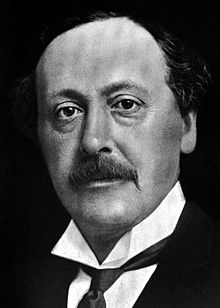Lord Gladstone
|
The Right Honourable The Viscount Gladstone GCB GCMG GBE PC JP |
|
|---|---|
 |
|
| 1st Governor-General of South Africa | |
|
In office 31 May 1910 – 8 September 1914 |
|
| Monarch | George V |
| Prime Minister |
South African: Herbert Henry Asquith |
| Preceded by |
Sir Walter Hely-Hutchinson as High Commissioner for Southern Africa |
| Succeeded by | The Viscount Buxton |
| Home Secretary | |
|
In office 11 December 1905 – 19 February 1910 |
|
| Prime Minister | Sir Henry Campbell-Bannerman H. H. Asquith |
| Preceded by | Aretas Akers-Douglas |
| Succeeded by | Winston Churchill |
| Personal details | |
| Born |
18 February 1854 Downing Street Westminster, Middlesex, England |
| Died | 6 March 1930 (aged 76) Ware, Hertfordshire, England |
| Nationality | British |
| Political party | Liberal |
| Spouse(s) | Dorothy Mary Paget (1876–1953) (m. 1901; his death 1930) |
| Alma mater | University College, Oxford |
South African:
Louis Botha
Herbert John Gladstone, 1st Viscount Gladstone, GCB, GCMG, GBE, PC, JP (7 January 1854 – 6 March 1930) was a British Liberal statesman. The youngest son of William Ewart Gladstone, he was Home Secretary from 1905 to 1910 and Governor-General of the Union of South Africa from 1910 to 1914.
Appointed whip in 1899, Gladstone was an innovator who provided a long term strategy, kept the party from splitting over the Second Boer War, introduced more modern constituency structures; and encouraged working-class candidates. In secret meetings with Labour leaders in 1903 he forged the Gladstone–MacDonald pact. In two-member constituencies, it arranged that Liberal and Labour candidates did not split the vote. Historians give him much of the credit for the Liberal triumph in 1906, with 400 MPs and a majority of 243.
Rising to Home Secretary in 1906-8, he was responsible for the Workman's Compensation Act, a Factory and Workshops Act, and in 1908 the eight hour working day underground in the Coal Mines Regulation Act. Historian John Grigg states that while his name is not often included in any list of radicals, his radical record is second to none in the Campbell-Bannerman Government. He was, to be sure, no firebrand, but a good party man whose common sense inclined him to be less 'Gladstonian' in the matter of State intervention then than his famous father had been. With his able under-secretary, Herbert Samuel, he sponsored no less than 34 acts Acts of Parliament during his time at the Home Office.
...
Wikipedia
